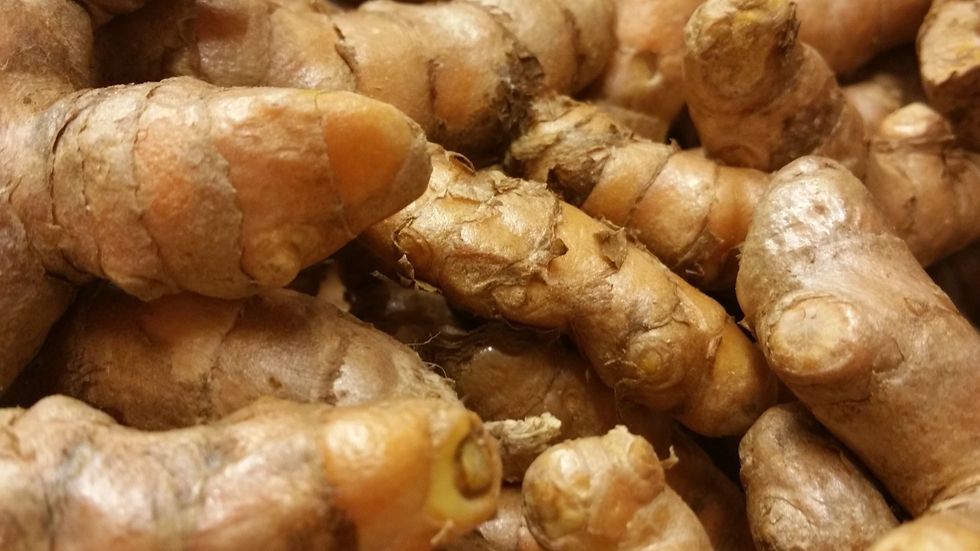Is turmeric good for you? Here's the science!
- Bethan Wainman

- Mar 2, 2020
- 4 min read
In our exclusive tea blend, Georgian Glow, we use a spice called turmeric. Many times we have been asked by customers online and at markets, ‘what exactly is turmeric and how can it improve my health?’ To answer these questions, we have decided to do a deep-dive into the benefits of the increasingly popular spice based on scientific research.

What is it?
Once exclusively reserved for Asian culture and cooking in dishes such as curries, recently turmeric has come into its own in Western countries too. You don’t have to go far to see turmeric (or ‘golden’) lattes in cafes; turmeric pills in pharmacies; and turmeric skin creams in natural health stores. In fact, Australia imported US$3.3 million worth of the spice in 2016 compared to US$2.2 million in 2015. This figure continues to grow and is much higher for our American and European counterparts.
Turmeric (Curcuma longa) is a perennial plant of the ginger family, Zingiberaceae. Curcuma has more than 100 species including white and black turmeric. The most popular variety (which you’ll find in our Georgian Glow blend) is Yellow Turmeric and it is sometimes known as the golden spice. Yellow turmeric powder has a bitter pepper-like flavour. It is grown in South-East Asia and is native to India.
What health benefits does it have?
Turmeric has been used in Ayurvedic medicine for thousands of years. This type of medicine is an ancient Indian system founded on the concept that health is achieved when the mind, body and spirit are in balance and promotes practices such as yoga, meditation and massage.
According to this theory, turmeric can help to relieve many ailments including improving the overall energy of the body, relieving gas, dispelling worms, improving digestion, regulating menstruation, dissolving gallstones, and soothe arthritis.
Many South Asian countries use it as an antiseptic for cuts, burns, and bruises, and as an antibacterial agent.

In Modern medicine:
The use of turmeric is very new in modern medicine compared to in natural medicine. Studies are currently being conducted across the world to prove its effectiveness and recent studies have had promising results. There are three main effects that researchers are currently looking at- joint pain and arthritis; heart disease and diabetes; and mental health.
Joint pain and arthritis:
Turmeric has been found to contain an important bioactive compound called curcumin. Research has found that curcumin has some anti-oxidant and anti-inflammatory properties. Because inflammation is linked to a range of chronic conditions and diseases, among them arthritis, Alzheimer's and heart disease, researchers argue curcumin could help reduce the risk of those diseases by limiting inflammation in the body.

"Curcumin is a very powerful anti-inflammatory agent," Professor Manohar Garg, director of a nutraceuticals research program at the University of Newcastle, told the ABC. "It's very powerful, the most powerful food I know of, for fighting inflammation in the body.”
Moreover, results of a 2016 systematic review and meta-analysis reported that in the three trials using a placebo as a control, daily curcumin supplementation over six to eight weeks resulted in reduced pain for arthritis sufferers compared with placebo.
Heart disease and diabetes:
Promising results were also shown for those with diabetes. A meta analysis set up to evaluate the effect of turmeric on blood sugar levels reviewed 11 studies where in total 1144 participants were randomised to receive either curcumin or a placebo. It found that curcumin supplements helped lower the blood glucose concentrations of people with pre-diabetes, diabetes or metabolic syndrome.

Mental health:
There's growing interest in the use of curcumin as an antidepressant. A 2017 meta-analysis reviewed six clinical trials encompassing a total of 377 patients with depression, comparing the use of curcumin with placebo. It found that curcumin significantly improved depressive symptoms in patients.
Dr Adrian Lopresti of Perth's Murdoch University is a clinical psychologist who conducts research in this area, and is the author of one of the trials reviewed in the analysis. "In my double-blind, placebo-controlled studies curcumin has been shown to effectively reduce depressive and anxiety symptoms in adults with mild to moderate depression," he said.

Can you have too much?
According to Natural Medicines, a database that provides monographs for dietary supplements; consuming it by mouth is safe, up to 2 grams of turmeric daily for a year, and 4 grams daily of curcumin for a month. The database also indicates turmeric is safe when applied to the skin, for instance as an ingredient in body lotions.
Although turmeric has shown to generally be safe, it is important to let your doctor know if you consume turmeric regularly to make sure it has no effect on your medication.
Where is your turmeric sourced?
At St. Julien Tea, we source local Australian ingredients where possible. Although turmeric is starting to be grown in tropical regions of Australia, it is unfortunately in too small a quantity for us to buy in the format we need. Therefore, we are currently importing turmeric from India, the biggest producer of the spice in the world. All of our turmeric is Australian Certified Organic which means it’s been grown without the use of synthetic or toxic substances for a three-year minimum period and contains no added artificial colours or fragrances. When Australian-grown turmeric becomes more readily available, we will be ready and waiting to source it.





Comments